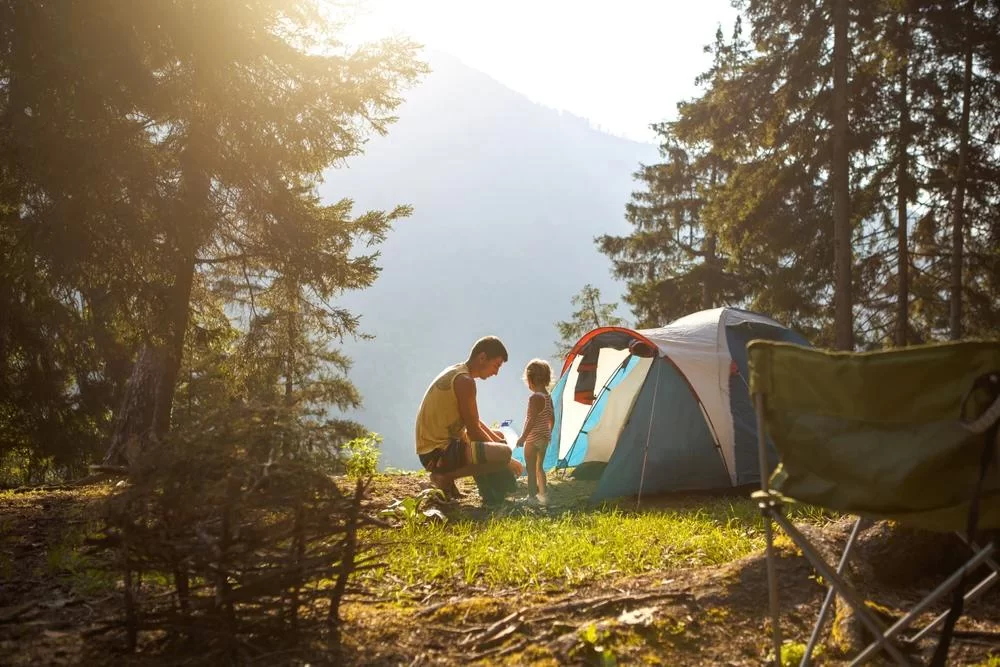Discover eco-friendly camping tips to reduce your environmental footprint while enjoying the great outdoors. Learn sustainable practices and how to make your camping trip more green and environmentally responsible.

How to Reduce Your Camping Footprint on the Environment: Eco-Friendly Tips for Sustainable Travel
- 1. Understanding Your Camping Impact on the Environment
- 2. Eco-Friendly Camping Practices
- 3. Choosing Sustainable Camping Gear
- 4. How to Reduce Waste While Camping
- 5. Real-Life Eco-Conscious Camping Stories
- 6. Enjoy Green Camping at Pine Cliff Resort
1. Understanding Your Camping Impact on the Environment
Camping is a wonderful way to connect with nature, but it’s important to understand that it can also have a significant environmental impact. From the trash we leave behind to the disturbance caused by human activity, camping can affect wildlife, soil quality, and ecosystems. By reducing your camping footprint, you can minimize these negative effects and contribute to the preservation of natural spaces.
The first step in eco-friendly camping is awareness. Knowing that something as simple as leaving a campfire burning or not disposing of waste properly can harm local wildlife is essential to making more sustainable choices. Understanding how your actions affect the environment will help you make better decisions for a greener camping experience.
2. Eco-Friendly Camping Practices
To reduce your environmental footprint while camping, adopting eco-friendly camping practices is crucial. Here are some sustainable tips to consider:
- Leave No Trace: This principle is the foundation of environmentally responsible camping. Leave no visible trace of your presence by cleaning up all waste, avoiding damage to plants, and respecting wildlife.
- Camp in established sites: Using designated campsites helps reduce the impact on natural habitats. It prevents the overuse of new areas and minimizes soil erosion, allowing ecosystems to recover.
- Be mindful of water usage: In areas with limited water resources, be cautious with your water use. Use biodegradable soap, and avoid washing dishes or bathing in natural water sources, as chemicals and soaps can pollute water ecosystems.
Incorporating these sustainable practices into your camping routine can help preserve nature for future generations.
3. Choosing Sustainable Camping Gear
Choosing the right camping gear can significantly reduce your environmental footprint. Here’s how to make more eco-conscious choices when selecting camping gear:
- Opt for reusable items: Avoid disposable items like plastic utensils and plates. Instead, choose reusable items such as stainless steel or bamboo cutlery, and bring along a reusable water bottle to reduce waste.
- Eco-friendly tents and sleeping bags: Look for camping gear made from sustainable materials. Many companies now offer tents made from recycled fabrics and sleeping bags filled with eco-friendly insulation.
- Choose solar-powered equipment: Solar-powered lanterns, chargers, and other gear can reduce the need for disposable batteries, making your camping experience more sustainable.
By investing in high-quality, eco-friendly gear, you not only reduce waste but also support companies that prioritize sustainability.
4. How to Reduce Waste While Camping
Reducing waste is one of the most important aspects of eco-friendly camping. Here's how you can minimize waste during your camping trip:
- Pack out all trash: This includes not only food wrappers and bottles but also food scraps. Many animals can be attracted to food waste, so packing everything out keeps wildlife safe and habitats intact.
- Use biodegradable products: Whenever possible, use biodegradable soap for cleaning, and choose environmentally friendly hygiene products such as natural toothpaste and shampoo.
- Bring reusable bags: Carry reusable bags to pack out trash, and avoid using plastic bags, which contribute to pollution.
By taking these steps, you can significantly reduce your waste and leave no negative impact on the environment.
5. Real-Life Eco-Conscious Camping Stories
Stories from fellow campers who practice eco-friendly camping can inspire you to adopt more sustainable habits. Take, for example, a group of campers who spent a week in a remote wilderness area. They made sure to bring only reusable gear, minimize water usage, and follow all Leave No Trace guidelines. At the end of their trip, they found that not only had they enjoyed the beauty of nature without harming it, but they had also developed a deeper respect for the environment.
Another camper shared a story about how they swapped traditional plastic tent pegs for biodegradable wooden stakes, significantly reducing their environmental impact while still enjoying a comfortable stay. These simple changes go a long way in making a positive environmental difference.
6. Enjoy Green Camping at Pine Cliff Resort
If you’re looking for a sustainable camping experience, consider visiting Pine Cliff Resort. This eco-conscious resort has implemented various sustainable practices, such as solar-powered facilities, waste reduction programs, and a commitment to preserving the natural beauty of the surrounding area.
Whether you’re interested in eco-friendly cabins or sustainable camping options, Pine Cliff Resort offers the perfect setting for a green getaway. By staying here, you can enjoy an unforgettable outdoor experience while supporting sustainable tourism.
Ready to reduce your environmental footprint while camping? Click here to book your stay and embark on a green camping adventure today!
Park Creek Campground
156 Forest Rd 156, Mackay, ID 83251, USA
Visit Location PageWhite Sand Campground
Powell Rd, Lolo, ID 43035, USA
Visit Location Page